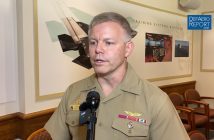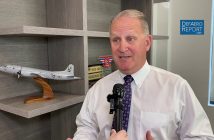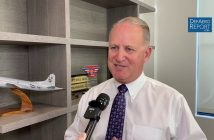Kasper Høeg-Jensen, the head of the security policy and operations department of Denmark’s ministry of defense, discusses closer Nordic cooperation, NATO, Greenland, China, climate change and more with Defense & Aerospace Report Editor Vago Muradian. The interview, conducted at the residence of Sweden’s ambassador to the United States, followed an Atlantic Council event in Washington marking 10th anniversary of the Nordic Defense Cooperation agreement to improve collaboration among Denmark, Finland, Iceland, Norway and Sweden.
Vago Muradian: Welcome to the Defense and Aerospace Report. I’m Vago Muradian here at the home of Sweden’s Ambassador to the United States on this, the tenth anniversary of the Nordic Defense Cooperation Agreement that brought together Denmark, Norway, Sweden, Finland and Iceland into a defense cooperative arrangement. Two of the nations, obviously, are EU nations — Sweden and Finland; whereas three are NATO nations — Denmark, Norway, and Iceland.
We’re honored to have with us KasperHøeg-Jensenwho is the Defense Policy Chief of Denmark. We had a chance to see each other in Copenhagen last year which was a great trip. Anybody who hasn’t been to Copenhagen, you have to put it on your travel list of places to go.
A great event at the Atlantic Council today where all the policy directors from all the countries as well as Major General [Klassen] was there who is the Chairman of the Military Committee.
Let’s first start with NORDEFCO. So as one of the founding members of the agreement, from a Danish perspective, what’s the view of the 2025 agreement, and what are sort of the most important elements of increasing cooperation among all five of these very important nations?
KasperHøeg-Jensen: What we have been pushing for from the Danish side is actually to strengthen the Nordic-U.S. cooperation. I think it’s important. We are a region that has different security affiliations, different relationships to the EU, to NATO. But we have a common relationship with the U.S. and I think we need to be more clear about that, present ourselves as a common entity as much as we can, and that’s what we have been focusing on from the Danish side.
Mr. Muradian: Do you see any tension between the fact that a couple of the nations are NATO nations, and some are EU nations. Spain I think was very clear, speaking from an organization perspective. [Effi Assad] who is the Dean of the Scandinavian policy community, given he’s been in the game for so long said look, this is very, very important. This is an additional add-on capability. But we don’t want to do anything that undermines or causes conflict, for example, with the NATO side of the alliance. What’s sort of the Danish view of that, given that you’re also a founding NATO member.
Mr. Høeg-Jensen: NATO is the cornerstone of our security. But certainly I think we will not compromise on that, that’s for sure. But whatever we can do to draw Sweden and Finland closer to us and to NATO I think is positive, and whatever we can do to enhance our cooperation in terms of operations to get to know each other in military terms even better is good for our security.
Mr. Muradian: Were you surprised at how quickly the nations have come together? Because if you look at it, Sweden has always, it never talks about people as allies, it talks of them as partners. Finland also has been very, they’ve both had this sort of tendency of being a non-aligned country. But then both joined the EU but decided not to go for NATO.
Have you been surprised at how quickly this coalescence has happened where you find Finland now and Sweden participating in major NATO exercises?
Mr. Høeg-Jensen: I haven’t been surprised how quickly it happened, but I certainly have seen a change after Crimea 2014. I think we’ve seen a change in the way Sweden and Finland is looking at NATO. I think we’ve seen a change in the way that they want to cooperate in the NORDEFCO framework, and I welcome that.
Mr. Muradian: Let me take you to the question of defense spending. Obviously that’s a big issue here in Washington, about how much our allies are spending. It’s a conversation that existed since the birth of the alliance. I think that Harry Truman was talking about NATO burden-sharing and contributions of everybody. We heard the Obama administration pushing NATO to do more. Certainly the Newport Summit happened after Crimea, and that’s when the two percent goal was instituted by 2024.
Denmark is a small country, 5.5 million people. You guys did a big lift to try to get it to a 1.4 percent GDP target. I remember when you guys brought that to Washington. Washington reminded you you were only .6 short. But then you guys had another big push that you did to try to increase that number.
How long will it take — first, how was this latest increase received by Washington? And how much longer before you get to that two percent goal, Kasper?
Mr. Høeg-Jensen: The latest push was actually well received. We had a NATO Ministerial here in February and we got very positive reactions from Shanahan and from key allies. So I think there’s a recognition that we opened, even just after one year while we have made one agreement, we opened it once again. We state very clearly that the Wales Commitment is the foundation of the next defense agreement so the commitment is there.
It will take time for us to reach 2 percent. I mean we have an election in two or three months’ time, so of course opening a defense agreement that short before an election is quite a political achievement, frankly. We have 85 percent support in parliament, so we have a broad support for that.
We also make the point that it’s not only about two percent. It’s also about political commitment. It’s about capabilities. And we deliver on most of our, almost all NATO capability targets. We are active in a lot of operations. We are in Afghanistan, Iraq. We are getting ready to enter in Mali. We are in the Mediterranean. We are in Estonia. So frankly, we believe that, and this is recognized by the U.S. very clearly. We are available when needed. I think that’s important.
Mr. Muradian: Is it frustrating from a Danish perspective to always be reminded of the amount at a time when you’re a small country? You’re making big investments, for example, like getting the F-35 which is a huge capability. Still have a very cutting edge military that’s still very engaged. Is that something that for many Danes they look at it and they go wow, you know, guys, we’re working really, really hard as a small country.
Mr. Høeg-Jensen: I wouldn’t say it’s frustrating. It’s a fact. I mean we recognize that we should do more. We think it’s fair that the U.S. is expecting us to deliver more on defense. But we think it’s important that we look at more than cash. We could increase the salaries of our officers or we could lower the pension age. We should look at output also. You cannot only look at input.
But that being said, we recognize that we have to do more and it’s a long-term ambition.
Mr. Muradian: Let me ask you about the question of climate change and the high north. Obviously Greenland and Denmark have had a long relationship. Greenland has greater autonomy than ever. A tiny community there, 50,000 people count themselves as Greenlanders. They do have one of the world’s coolest flags, though. You have the oldest flag in the world, but they have one of the coolest flags in the world.
Talk to us about the contested Arctic space. You have China, for example, that was trying to build airports to curry favor and influence in Greenland and there were very strong security concerns from Denmark about that. Talk to us about the whole space, the dynamic, and the situation that everybody will be living with given that the space will become a more contested space as climate changes and the area becomes more inhabitable.
Mr. Høeg-Jensen: Greenland is a vital part of our kingdom. So is the Faroe Islands, has been there for hundreds of years. We see changes in Greenland. We see the ice melting. We see increased activity. We see increased awareness and presence, and we have to be very cautious when dealing with Greenland. It’s a very small community, as you say. 55,000 people in an area that’s larger than Europe. So we are doing what we can to assist Greenland.
So when we see Russia doing military buildup, when we see China offering investments that can influence the politics of Greenland, we have to be cautious. This is why the Danish government has decided to assist the new airport structure in Greenland in a very active way. This is also why we have taken steps to renew our presence and increase our presence in Greenland. Partly because there’s increased activity, we have responsibilities up there, but also to show very clearly that this is our territory and it’s a concern of ours, and it’s a key area where we cooperate with the U.S. We have the Thule Air Base, that’s an area where we cooperate closely. And I think that’s an important point of our contribution to U.S. security, frankly.
Mr. Muradian: NATO has a renewed focus on the North Atlantic, and from a Danish perspective, that’s welcome. Obviously Norway and a lot of the countries in the high north look at that favorably. How does the new command structure and new focus from your structure change the dynamic in the region and improve deterrence?
Mr. Høeg-Jensen: We welcome that. We think it’s relevant that NATO focus more north. We think especially the North Atlantic sea lines of communication are vital for European security. So we are increasing our presence in the new command in Norfolk. It’s a key feature in the new command structure. And I think we will develop the links also between our structures in Greenland and the U.S. structures.
So we are increasing our cooperation with the U.S. in the Arctic area.
Mr. Muradian: I should have mentioned, the reason why I was vapor-locking for a second is it’s three airports, right? So the Chinese deal was we build three airports for you. And now from the Danish perspective, you guys are now building those three airports.
Mr. Høeg-Jensen: We’re financing them, or helping to finance them. I mean we welcome Chinese investment. We welcome Chinese economic activity in Greenland. But of course we have to be very cautious that this is not tied up on financial conditions that are difficult to deliver on.
So we will now have an open tender on these airports, and Chinese companies are welcome to join. If they are the best they can build, but the financing and the ownership is kept on Danish/Greenland hands. I think that’s an important point.
Mr. Muradian: Let me ask you one last question, but it’s going to be sort of a conjoined China and Russia question.
There’s a big dispute with Washington and a lot of its allies over, for example, 5G. Denmark has acquired Huawei communications equipment and networking equipment just like a lot of countries did. Germany, for example, has said we’re going to keep doing it, despite Washington’s concerns over that.
More broadly, looking at cyberspace, AI, electronic warfare, disinformation. What are the right ways for the alliance to balance and get right the security equation given that it’s an interconnected universe? If I’m China and I want to compete against Washington, or undermine Washington, I’m going to want to do intelligence anywhere I can, even if it’s through allied countries.
What’s the right way to think about this space, the importance of cyber, the importance of 5G to make sure that all of the alliance countries are getting it right?
Mr. Høeg-Jensen: Intelligence cooperation with the U.S. is key for Danish security. We have a very close cooperation there. NATO has been working hard on conventional deterrence in our region, and has been successful in that sense in relation to Russia, and we welcome that. I think in the cyber area, it’s a tricky area where you have commercial actors and you have government actors. We don’t have a law that prohibits special investments, but we can certainly advise key players in the sector, and I think we also need to increase our cooperation on the cyber field as allies and in NATO.
Mr. Muradian: Actually two more questions.
One, Russia. From the behavior of Russia, if you look at it, the amount of undermining Russia is doing, you have all the conventional military capability that’s arrayed against the alliance to threaten it, but you also have a lot of very, very subtle means. As Harlan Ullman of the Atlantic Council and the Naval War College raised, that’s actually the biggest threat, is the electromagnetic spectrum, cyber operations, disinformation, in which Russia has been extremely active in every single country in Europe. There are traces that the Russians not only affected the political outcomes in the United States, but also the Brexit election. They tried in France. They’re working in Sweden and Finland. You’ve even seen it in Denmark, for example, in some very, very sophisticated disinformation campaigns.
From your perspective, is the alliance doing enough to dissuade and deter Russia on that front?
Mr. Høeg-Jensen: Well, the alliance is trying to get its act together. It’s a difficult field. It’s also a field that is a key intelligence area. And the alliance is not a key intelligence player. A lot of the intelligence cooperation is taking place in small circles, in bilateral relationships, and that’s just how the nature of intelligence is.
We have elections in Denmark in two or three months’ time, and we have taken very clear steps to deter against influence campaign. How do you do that? You do this by awareness. You educate your public. You educate your parliament, your politicians. You make sure that cyber protection and cyber security is up to date. And you make sure that your intelligence service is focused on the threat and try and do as much as it can to get early warning. So this is what we’re doing.
Mr. Muradian: And let me ask you one last question. Even though there are no U.S. forces that are based in Denmark, how does the administration’s new cost plus 50 percent proposal, that NATO nations must pay not only the cost of hosting American troops, but then 50 percent additional for that. Is there a concern that this could undermine cohesion in the alliance and create rifts that, for example, either right or left-wing groups can take advantage of to say see, we shouldn’t be part of an organization like this when a big and wealthy country like this is putting this kind of pressure on us? That’s been a little bit of the narrative that’s been stitched. Do you have a concern that an initiative like that can be something that weakens or undermines the alliance?
Mr. Høeg-Jensen: I think as I said, we recognize that Europe has to do more on defense. I think it’s important to be aware that of course the U.S. presence in Europe is also of value to the U.S. itself. So discussing, I mean how do you cross that is very difficult. I think it’s a discussion that you have to be very nuanced about so that you don’t lose the important link that is taking place with the presence of troops.
Mr. Muradian: Kasper Høeg-Jensen who is the Policy Director of Denmark’s Ministry of Defense. Kasper, it’s always a pleasure. Thanks very much. Thank you for taking so much time out of a reception to talk to us. We appreciate it.
Mr. Høeg-Jensen: You’re welcome. Thank you. Pleasure.
30




